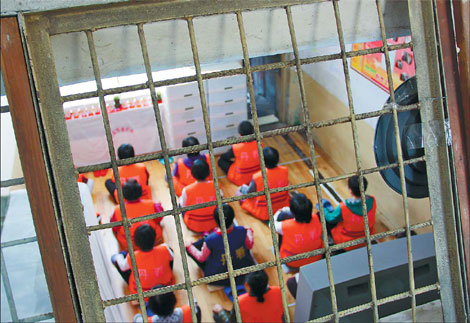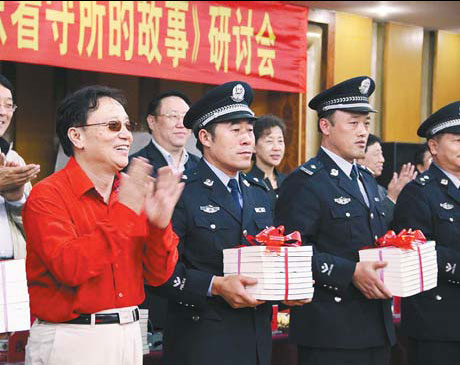The inside story
Updated: 2011-11-10 07:58
By Mei Jia (China Daily)
|
|||||||||
|
Female detainees, including a death row detainee who wears a blue vest and shackles, sit in a room at Dandong Detention Center. Photos by Mei Jia / China Daily |
Detention center officers increasingly assist detainees, helping them adjust to their situations and build new lives. Mei Jia reports.
It was dawn on a bleak winter's day in early 2008, when detention officer Wei Hongzhao sat silently with a man outside the iron doors of Dandong Detention Center in Dandong, Liaoning province, waiting for his ex-wife to pick him up.
Xi Bao (not his real name) had been released from eight months in detention after being convicted of the "crime of injury".
Xi's ex-wife had made a deal with Wei, saying if she forgave Xi and agreed to reunite with him, she would turn up that morning. The two men waited for an hour, while Xi fidgeted in the semi-darkness.
Finally, she appeared.
Dandong Detention Center is a place of dramatic transformation. It's where detainees are removed from society, confined and atone for the harm they may have done.
Officers like Wei spend much of their time helping detainees adjust to the transition and build new lives for themselves.
Wei recalls the initial weeks of Xi's detention.
"When I first saw him, he wouldn't talk to anyone and there was no support from outside," Wei says. "He muddled through my inquiries by repeating, 'I'm OK'."
Wei's experience, however, suggested Xi needed help.
"I'm not worried about a detainee who arrives and is talking all the time. What worries me are the silent ones with heavy burdens on their minds."
Wei bought Xi clothing and dishes, and encouraged him to talk. Eventually Xi confided that his one wish in life was to reunite with his wife, the mother of his daughter.
Xi admitted that he used to get drunk and beat up his wife, which led to the divorce. He further confided the reason he was found guilty and sentenced to eight months in detention was that he beat up a man who made sexual advances to his ex-wife.
Wei called the woman, and eventually she agreed to a meeting with Xi at the detention center. There, the woman said she would consider Xi's proposal.
Wei says Xi cried when his wife turned up outside the detention center on that wintry day in 2008 to meet him after he was released. Xi quit drinking and the couple remarried.
"We used to treat detainees simply as enemies of the people years ago, like they were evil incarnate," the detention center director Dai Xiaojun says. "But in recent years, we have begun to realize that they're people with faults who have made mistakes."
Detention officer Guo Jun puts it this way: "The convicted used to be called criminals, now they're called detainees. Most of them will return to new lives and, in some cases, they belong to disadvantaged groups who have to experience the worst days of their lives with us."
This change in mindset was boosted by an April 2009 directive initiating seven new principles for the supervision of detainees intended to improve detention center care.
Writer Li Di, 63, visited Dandong Detention Center in 2009, when he was researching a novel. He returned six times.
"The eyes of the detainees were full of regret and eagerness for freedom," Li says. "I decided only a book about their real lives there could fully describe what I experienced."
The book, Stories of Dandong Detention Center, called for more understanding of the plights of detainees among the public.
Dandong Detention Center also deals with death row detainees, who wear blue vests (rather than the usual orange) and shackles.
"Prisons don't have death row criminals," the detention center's director Dai says. "Here, I have around 50."
He says detainees face just three options: Returning to their lives if proved innocent; serving up to 12 months in detention or being transferred to a prison for a longer term; or awaiting execution.
In each medium-sized detention room, crammed with 20 some detainees, there is both joy and despair.
Since the death row detainees' shackles have no lock or key, fellow detainees listen for the sound of the shackles being forced open in the morning, knowing this means freedom or death to the detainee in question.
Wang Jing, the center's deputy-director, recalls the case of one detainee, Zhou Jie (not her real name) who was to be executed for murdering a man she owed money to.
Wang ensured that Zhou's last wish, to see her birth parents, came true. He contacted them through Zhou's adopted parents and on the day of execution, they were there holding red umbrellas, so that Zhou knew who they were.
Wei Hongzhao showed similar compassion to a young detainee on death row who killed his girlfriend.
When he arrived at the detention center, Zhou Hai (not his real name), born in 1985, was unable to talk about anything except the time he fell in love with his girlfriend on the military parade ground.
"Wei told me to let him just talk and give him an outlet for his emotions," the writer Li recalls. "And I listened for three days, but our discussion never moved beyond that day of military training."
|
Writer Li Di presents his book, Stories of Dandong Detention Center, to the center's officers. |
Wei later helped Zhou retrieve his online messages to the girl.
The detention center officers have also, on occasion, encouraged death row detainees to appeal for reprieve through the Supreme People's Court.
When Liang Yue (not her real name) was detained for murder, she gave up all hope. But she hadn't told the court the whole story about her situation and only did so when the center's deputy-director Wang Jing - after numerous conversations and exchanges of letters with her - said she should make an application for clemency.
In appealing to the Supreme People's Court, Liang wrote a letter of confession about how the murdered man had violated her.
In January she was given a reprieve from death row and instead went to prison in Shenyang, Liaoning province.
Detention center director Dai says he regards all detainees as family members and asks detention center officers to do the same.
"I can't just go home and fall into a comfortable sleep," Dai says. "I need to make sure that all the people here are safe and sound."
In December, Dandong Detention Center will move to a new site, with better facilities.
Gao Wei from the Writers' Association and writer Li Di contributed to this story.













